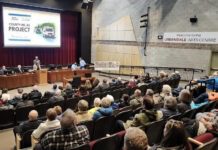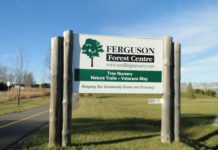by Marie-Therese Voutsinos B.Sc. Biol., Agr., M.Sc. Agr.
The fate of the Kemptville Agricultural College farm is in crisis. The showcase farm buildings and surrounding hundreds of acres of good arable land are at risk with the decision of the provincial government to build a correctional facility there.
Arable land is a nonrenewable resource that is disappearing at an alarming rate around the world. Here in Ontario, and in the rest of Canada, farmland is becoming increasingly hard to find, with urbanization continually encroaching on it. Chinese corporations have been discreetly buying farmland in eastern Canada and elsewhere in the world, to keep in agricultural production for their own use, according to “La Terre de chez-nous ”, the main agricultural newspaper in Quebec. Who supplies garlic to our grocery stores in winter time? China does, and has for a few years now.
There is no reason we cannot produce our own garlic in Ontario. We have the know-how and the climate for it. In addition, we have a growing number of market farmers looking for good land with proximity to large customer bases. This land is rarely affordable enough for starting small farms. Renting land then becomes a viable option. In Ottawa, the National Capital Commission (NCC) has developed programs that establish market farms on arable land rented within its boundaries. One of these programs is developing a network of farms within 10 minutes of downtown Ottawa, according to the NCC’s website. The farming techniques used in these instances produce little noise, and few to no pesticide sprays, so urban farming without nuisance factors is possible. This model could be used at the Kemtpville College Farm with its hundreds of acres of farmland.
Ontario arable lands near urban areas play an increasingly crucial role in providing and securing food supplies in these uncertain times of pandemic and climate change. We have all seen food flying off the shelves in grocery stores this year. Food security is on people’s minds. Construction of new facilities, whether residential, industrial or correctional, should be directed to lands that have little agricultural value, which are plentiful, unlike good farm land. Agricultural lands have been protected in Quebec for almost 40 years now; this is a good time for the province of Ontario to do the same.
A lot of resources have gone into building the barns, state of the art stable, outbuildings, and teaching facilities at the College Farm. It would be an incredible waste to put them to the wrecking ball to make room for non-agricultural facilities of any kind. Instead, the barns could be used for sustainable, low-emission animal production, for which there is increasing demand. Facilities already there would allow pilot projects, teaching, and establishing of ecologically mixed farms to supply the local meat, vegetable, and value-added product markets. Such a use of the College Farm would allow the new generation of young farmers a place to start small farm businesses, with peer and technological support. Bringing in such small businesses is good for local employment and sustainable economies, a major advantage during the devastation of COVID-19.
The College Farm could also play a role in improving food security and the availability of healthy foods in North Grenville, both of which are becoming increasingly important. Community gardens are a great way to supply inexpensive fresh produce to anyone who wants to grow their own. Teaching kitchens foster and encourage the use of the healthy foods grown locally, an excellent component of disease prevention, which becomes even more crucial in times of pandemics. The City of Kingston has several well established community gardens and kitchen programs. There is no reason why North Grenville could not have the same, given the amount of good land and kitchen facilities available at the Kemptville Agricultural College.
The part of Kemptville College Farm that has been designated for the correctional facility should be reunited with the part now belonging to the Municipality of North Grenville, as previously requested. Its use should be returned to agriculture, unless we, the residents of Ontario, want to continue buying fresh produce from China, when the farm could be turned into a facility to supply garlic and other fresh vegetables such as squash, year-round. The whole College Farm could also supply an increasing demand for local foods produced sustainably, respectful of soil and water resources. But first, it would be best to keep all that good, arable finite land resource out of the real estate market, and away from Chinese corporations, permanently. Husbandry of that exceptional farm is best done by local government and/or agricultural cooperatives, rather than absentee owners who do not have to live with the consequences of what is done there.
The best scenario is to let the Municipality buy the rest of Kemptville College Farm. The Municipality can then develop sustainable programs such as the NCC is doing in Ottawa, and rent the land to small farmers for local food production. Producing our foods and other essential goods locally is necessary to reduce the risk and impact of pandemics, and to improve our local economy.






